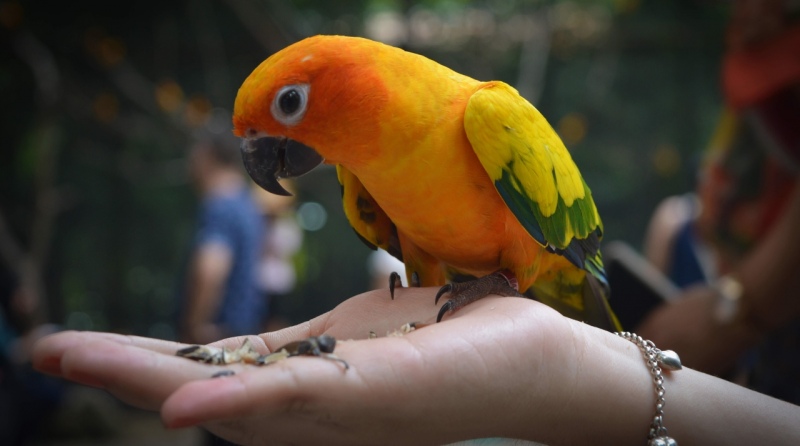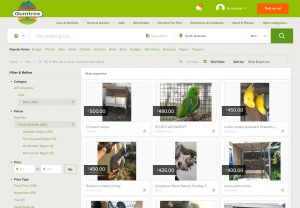Getting our birds to breed is the ultimate goal for most aviculturalists. But once you’ve got an aviary full of young birds, how do you approach selling them? The longer you hold onto young birds, they more they will cost you in food and maintenance effort. But trying to sell them quickly may mean accepting a much lower price.

This article will look at some of the possible selling methods and discuss their pros and cons.
Selling Avenues
Pet Stores & Dealers
Selling to a store or dealer is a good way to offload a substantial number of birds very quickly. Many will buy almost anything you bring to them, however be aware that they will usually pay you far less than a private buyer. You can expect to receive only 20-30% of the retail price for your birds.
One big advantage of selling through a dealer is that you don’t need to invite buyers onto your property to conduct the sale. Those keeping rare or expensive birds will appreciate not needing to allow potential buyers to enter their property.
Bird Clubs & Sales

Selling through a bird club or a bird sale is one of the most effective ways to sell birds, but it’s not completely without flaws.
Sellers are usually able to clear a large quantity of stock in a short period of time, typically at prices somewhere between what dealers would pay and what dealers would sell for. Birds only experience discomfort or about half a day before they’re re-homed, and you can generally be sure that the buyer is an experienced bird keeper.
One potential issue is that bird sales or club events are only held a few times each year. You could find yourself with a large number of birds waiting to be sold, but the next sale not happening for several months.
Classifieds Websites
Generic classifieds sites usually have a lively section for pets. Gumtree in Australia and Britain and Craigsist in the United States are considered to be the most popular, with many others available in different countries or regions. There are also pet (or bird) specific classifieds sites such as Australian Pet Link or Hoobly USA.

When listing your birds on classifieds websites, there’s a few important things to keep in mind. Firstly, never post your full address on the site, especially if you have rare or expensive birds. This makes it too easy for thieves. When negotiating over price, expect lots of unreasonably low offers. Many people browse classified sites looking for bargains that they can resell at a higher price. Finally, never send off your birds until you’ve received payment. In most cases, it’s much safer to meet with the buyer face to face.
Your Own Website
Running your own website gives you a much finer degree of control over the sale of your birds. The price haggling you see on classifieds websites is largely avoided and you can demand a near-retail prices.
Building your own website does require a substantial initial investment (unless you have some intermediate technical skills), plus the additional time commitment of site updates and marketing. Unless you’re producing a significant number of valuable birds – with good consistency – it simply isn’t worth the effort.
Things To Consider
Security
Birds are an attractive target to thieves. Many are worth considerable amounts of money and are kept outside unsupervised all day and night. Each time you allow a potential buyer onto your property, you’re giving them an opportunity to observe the birds you keep, the security precautions you have in place, where to enter and exit the property, which aviaries are visible from the house, where the nets are stored, etc. etc.
If you’re worried about giving potential buyers access to your property, it may be possible to arrange exchanges in a neutral location. You might find many buyers will disapprove of this arrangement as they would strongly prefer to inspect the living conditions of any bird prior to adding it to their collection.
Potential thieves can be discouraged from returning to your property by taking certain precautions. High fences, lockable gates, security cameras (even fake ones), big dogs, and padlocked aviaries will all discourage thieves. The design of your aviary area is also important; you should have a clear view of the aviaries from a window of the house and the area should have some ambient light so that you can see what’s going on at night.
Animal Welfare
Birds are much happier in their spacious aviaries than in little boxes or cages. Before selling your stock to a dealer or pet store, make sure they provide suitable housing or are at least able to re-home the birds quickly.
If selling birds at a bird sale, they should be kept in a very small cage to prevent them from being able to injure themselves by flying around when startled. While some misguided activists believe bird sales are cruel, they are actually one of the most efficient ways to get birds into the hands of competent keepers who understand their housing requirements.
Conclusion
As you can see, there’s lots of different avenues in which birds can be sold; with many different considerations to be made. Each breeder’s needs are different, and there are almost certainly considerations that haven’t been discussed in this blog post. Try talking to fellow breeders in your area to find out what selling methods work best for them.
Question I sold a hahns macaw in good health, he died with the new owner 3 days later. The necropsy showed underweight no food or water in the body. Now she demanding her money back, what are the laws regarding this? I contacted gumtree fair trading australian consumer law there is nothing.
That’s a tough one. If the new owner didn’t notice the bird wasn’t eating for three days, and didn’t reach out to someone (or you) for help, they absolutely shouldn’t get their money back.
They could go after you in small claims, but if there’s a necropsy that confirms neglect, it’s hard to see you losing.